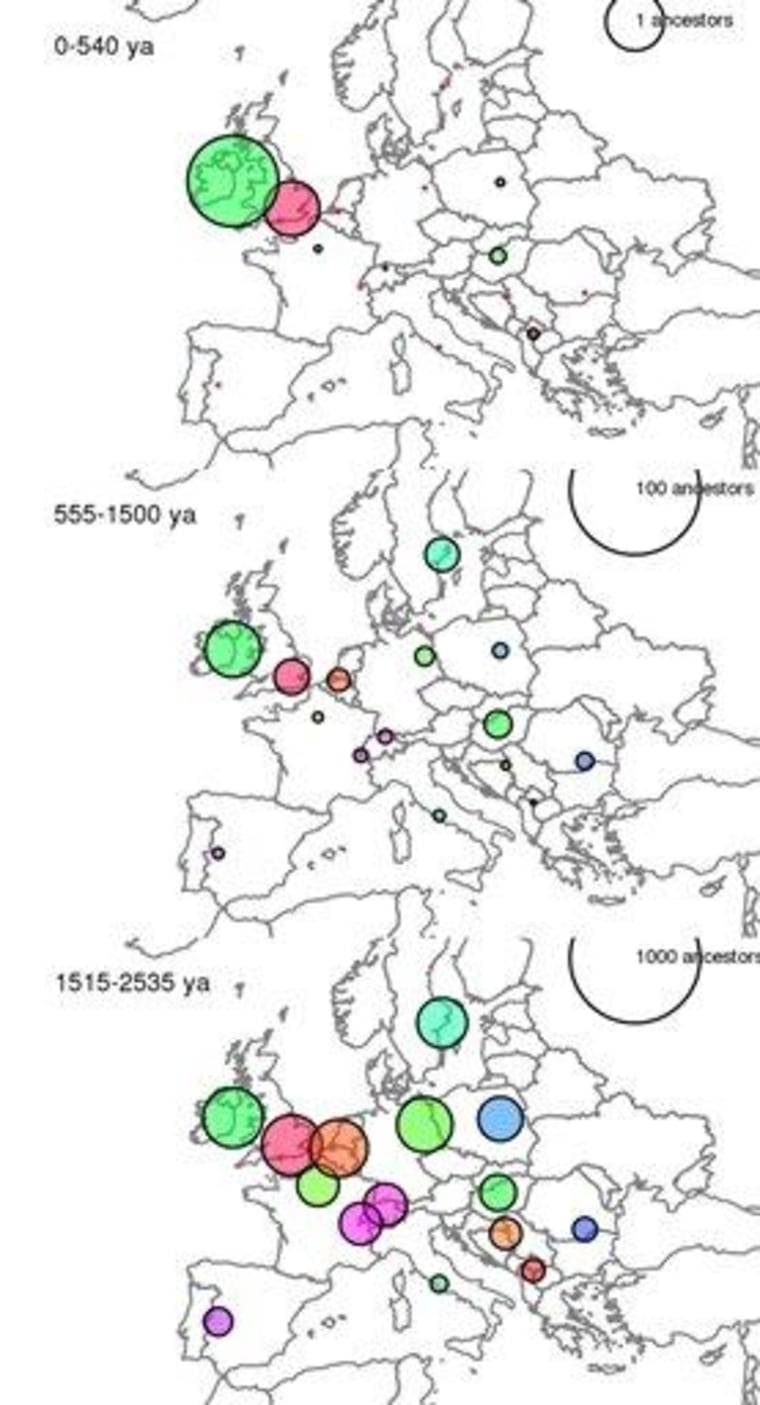A genetic survey concludes that all Europeans living today are related to the same set of ancestors who lived 1,000 years ago. And you wouldn't have to go back much further to find that everyone in the world is related to each other.
"We find it remarkable because it's counterintuitive to us," Graham Coop, an evolutionary biologist at the University of California at Davis, told NBC News. "But it's not totally unexpected, based on genetic analysis."
Family researchers have long known that if you go back far enough, everyone with a European connection ends up being related to Charlemagne. The concept was laid out scientifically more than a decade ago. Now Coop and University of Southern California geneticist Peter Ralph have come up with the evidence. Their findings were published on Tuesday in the open-access journal PLOS Biology.
"Anyone alive 1,000 years ago who left any descendants will be an ancestor of every European," the researchers say in an FAQ file about their study. "While the world population is larger than the European population, the rate of growth of number of ancestors quickly dwarfs this difference, and so every human is likely related genealogically to every other human over only a slightly longer time period."
Those conclusions are based on a survey of genetic sequences from more than 2,000 individuals spread from Ireland to Turkey. Ralph and Coop used computer software to search for telltale strings of DNA coding that are common to wide segments of the European population. The length of such strings can be used as a statistical yardstick to determine relatedness: Longer strings suggest that a common ancestor lived more recently.
The researchers were surprised to find that even individuals living as far apart as Britain and Turkey shared a chunk of genetic material 20 percent of the time. To explain that degree of genetic commonality, the researchers say those pairs of individuals would have to have a huge number of common genealogical ancestors 1,000 years ago — a number that takes in everyone who was alive in Europe back then.
Coop stressed that common genealogical ancestors are distinct from common genetic ancestors. "If you go more than eight generations back, you've got so many ancestors back there, it's unlikely that all of them have contributed genetic material to you," he explained.
People who live closer together tend to be more closely related, as you'd expect. The survey also found that the degree of relatedness varied among present-day European populations: Italians tended to have lower levels of relatedness, to each other and to other Europeans. That may be because there was a long history of distinct cultures in that region, the researchers suggest. Eastern Europeans, in contrast, showed more relatedness than the average, perhaps due to the Slavic expansion into that region more than 1,000 years ago.
Teasing out all those relationships will be the focus of future research, made possible by the proliferation of genetic data and analytical tools. "In the next couple of years, we'll have these kinds of studies applied globally," University of Arizona geneticist Michael Hammer, who was not involved in the PLOS Biology study, told NBC News.
The cold, hard genetic evidence points to a warm and fuzzy fact. "It underlines the commonality of all of our histories," Coop said. "You don't have to go back many generations to find that we're all related to each other."
More about genetic ancestry:
- First love child of human and Neanderthal?
- DNA can reveal ancient hair and eye color
- European genes shifted 4,500 years ago
You can read the full study, "The Geography of Recent Genetic Ancestry Across Europe," and a less technical synopsis of the research on the PLOS Biology website.
Alan Boyle is NBCNews.com's science editor. Connect with the Cosmic Log community by "liking" the NBC News Science Facebook page, following @b0yle on Twitter and adding the Cosmic Log page to your Google+ presence. To keep up with NBCNews.com's stories about science and space, sign up for the Tech & Science newsletter, delivered to your email in-box every weekday. You can also check out "The Case for Pluto," my book about the controversial dwarf planet and the search for new worlds.
